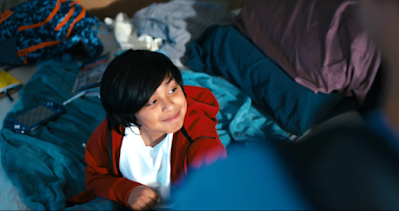by Douglas Messerli
Ahuatl Amaro (screenwriter and director) Physical Therapy / 2024 [9 minutes]
Ronnie (Jason Genao) is a cute gay physical therapist working with poor
Hispanic children such as the one represented in this short 2024 film by the
charming physically disabled Leonard (Aidan Gutierrez), whose mother and he
have been forced to move because of finances, making it difficult for Ronnie to
even find them, the subject of the first few frames of this film.
Today, since the new apartment
is still filled with boxes, Ronnie suggests that he take Leonard to the park
for his therapy, a delight for the boy, who obviously enjoys the company of and
looks up to the kind and friendly physical therapist.
Since he doesn’t have a
father, and at school it’s going to be the fathers’ visiting day, he wonders if
Ronnie can come and talk to his class. Ronnie wisely says he’ll have to think
about it, which means he’ll need the permission of his superior, something,
after we later encounter her, that is highly unlikely. But even the
half-promise gives the child joy.
Yet as the boy encounters
other children playing nearby when goes to retrieve the ball and they make fun
of him, he pauses, wishing that he were “normal.” That word sets off a trigger
in many a gay man who has been treated and called by others as something
perverse and abnormal since childhood. Ronnie explains that there is no
“normal,” and mutters a rap of his own wishes:
“Yeah, I wish I was stronger too.
And I wish, I wish, I wish
‘I wish I were a little bit taller
I wish I were a baller,
A billionaire, private jet
Record label, shot caller.’”
The boy points to the nearby tree, “Well at least you could climb a
tree.”
How can Ronnie resist in
helping Leonard get to the first notch of the tree, from which the child calls
out joyfully, only to fall the very next moment?
An ambulance is called. Leonard
is all right, no bones broken, but Ronnie’s superior puts him on desk duty
until things are settled with the boy and his mother, which means he himself
won’t be paid until he’s given permission to see patients again.
And now Ronnie must make a
decision whether to remain in a job with low wages and little future or babysit
children who their parents want out of their lives.
There is little question in
this small film, full of heart, what Ronnie’s decision will be, which for me is
the movie’s failure. Amaro’s film has a case to make, and succeeds in making
it; and anyone with an ounce of empathy—now seen as a detriment by our current
government officials—would agree with Ronnie’s decision.
But then we have no real
tension in this narrative other than the basic poverty of Ronnie’s patients and
his own life. The poor are always ready to help their own kind, while the
wealthy and even the middle class seek out differences from which they can
remove themselves or mock.
Yet life doesn’t always fit
that banner of goodness. Many of the poor and abused were among those who voted
for precisely the ones who desire to squelch any empathy that might remain in
their minds. And occasionally, it is those of wealth and those with
middle-class values who reach out to help the poor and disadvantaged. Alas,
this film, for all its good attentions, portrays human behavior as narrowly as
do our current government leaders. Perhaps the director might have at least
given Ronnie some deep soul-searching and doubts about his good deeds. Even the
saints suffered for their “alternative” choices and actions.
And, finally, it is perhaps
the children of those who least care for them that might just need someone like
Ronnie.
Los Angeles, July 7, 2025
Reprinted from My Queer Cinema blog (July 2025).





No comments:
Post a Comment